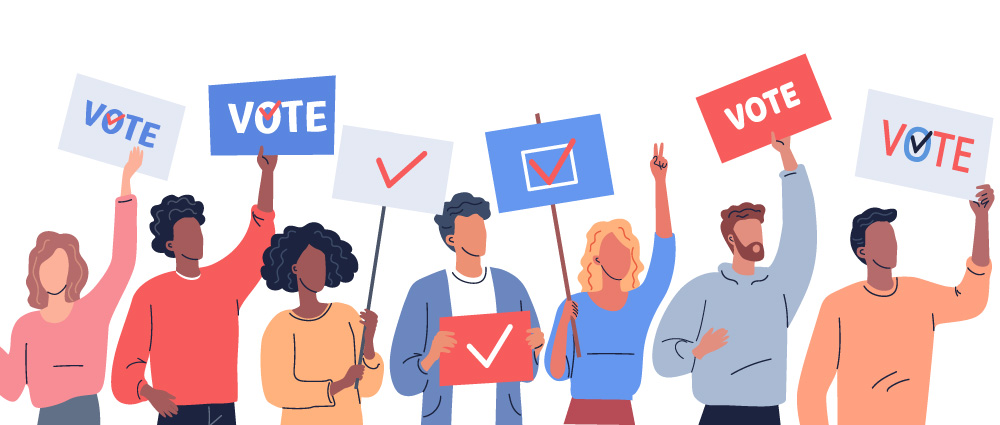A vibrant and fully enfranchised electorate is the best guarantee to protect our secular Constitution and secular government.
A diverse electorate ensures that no sect or group can take charge of the government to privilege itself. Protecting voting rights — and thus our democracy — is an issue that should concern all secular Americans. Without a functioning democracy, the wall of separation between state and church cannot be protected or rebuilt.
Restrictive voting laws are a tool used by Christian nationalists
In recent years, a number of laws seeking to suppress voting rights have been passed or introduced by state legislatures. Many of these laws are rooted in Christian nationalist ideology, as the goal is to restrict voting by students, minorities and lower-income populations whose voting patterns are antithetical to the movement’s goals. For instance, laws restricting voting on Sundays are motivated by the desire to enshrine Christian teachings regarding the Sabbath into the law and to negatively impact minority voters, especially Black communities, which often hold community voting events on Sundays.
A concerted effort is underway to change state voting and election laws to make it harder for citizens to use the election process to advance ballot measures. For example, in August 2023, Ohio’s conservative Legislature recently attempted to make it more difficult to pass ballot initiatives in an effort to prevent reproductive rights advocates from getting a pro-choice constitutional amendment on the state’s ballot. By the end of 2023, citizens in seven states had successfully enshrined the right to abortion in their state constitutions via ballot measures, and many more such campaigns are underway in 2024. Christian nationalists know that the majority of voters oppose extreme abortion bans and intrusive limitations on reproductive freedom, which is leading the ultra-religious right to further attack voting rights.
Christian nationalists want to suppress the votes of nonwhite and nonevangelical Christian Americans knowing that such voters, if given full and equal access to vote, have the power to thwart the Christian nationalist agenda on both the state and national level.
FFRF supports the John Lewis Voting Rights Act
FFRF continues to urge Congress to pass the John Lewis Voting Rights Act, which would restore the Voting Rights Act requirement that states with a history of voting rights discrimination must get preclearance from the Department of Justice before making any changes to voting laws. The Freedom to Vote Act would also make Election Day a national holiday — as it is in many other democratic nations — allow early voting at least two weeks prior to Election Day, allow voting by mail with no excuses and drop boxes for such ballots, require states to make voting more accessible for disabled individuals, and require same-day voting registration and online registration. While passing the John Lewis Voting Rights Act is unfortunately an uphill battle, FFRF’s advocacy arm, FFRF Action Fund, will continue its efforts on the behalf of this essential piece of legislation.
FFRF successfully sued to end religious oath requirements for voter registration
FFRF opposes the exclusive use of religious oaths in civic participation. Alabama had an outlier requirement requiring citizens to swear an oath containing the phrase “so help me God” in order to register to vote. FFRF filed a federal lawsuit in October 2020 challenging the mandatory religious oath for voter registration. Within six months, Alabama had agreed to amend its voter registration forms to allow citizens to opt out of the religious oath — both online and in printed forms.
The ability of Americans to run for office without being forced to swear an oath to a god is also essential to ensure that nonreligious and minority religious citizens can participate equally in our political system. In 2023, FFRF filed a federal lawsuit challenging New Jersey’s requirement that candidates for public office sign a religious oath in order to be listed on the ballot. Within a month, the state had agreed to amend the form and provide a secular affirmation option for nontheistic candidates such as our plaintiff.
Court reform is necessary to protect and improve voting rights
The wall of separation between state and church cannot be rebuilt and protected without court reform. FFRF has long advocated for court reform, having recognized early on that the constitutional principle of separation between state and church is endangered by the extremist capture of the federal judiciary, which involved the hypocritical suppression of President Obama’s election-year Supreme Court nomination contrasted with the expedited hearing and approval of a court nominee by President Trump during an actual presidential election period. This court reform involves an expanded Supreme Court. This court and lower federal courts have been broken for far too long, creating an existential threat to our secular democracy. For voting rights to remain safe, or have any hope of improving, we must have judges at all levels of the federal judiciary who are ethical, fair, well-qualified and representative of the entire American population, not just white evangelical Christians.

